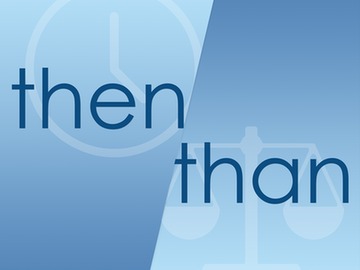What to KnowThan is used in comparisons as in "she is younger than I am" and "he is taller than me". Then is used to talk about time as in "back then, I lived in Idaho, " "we'll have to wait until then. " and "the then governor [the person who was governor then]."
These two words, which are often pronounced the same way and are distinguished in spelling by only one letter, have very different meanings and uses, but they are frequently confused.

Keeping 'Then' and 'Than' Separate
To keep this pair of words straight, focus on this basic difference: than is used when you're talking about comparisons; then is used when you're talking about something relating to time.
When to Use Than
Than (for comparisons) is the word to choose in phrases like smaller than, bolder than, and easier said than done. And it's the word that follows other, rather, less, and more. It’s also used in the phrase “no sooner … than” to say that something happens immediately after something else: “we had no sooner wondered where he was than the doorbell rang.”
He grew up to be taller than his father.
She was happier than a pig in mud.
More than enough food was available.
Other than milk, the fridge was empty.
Rather than walk, she called a cab.
When to Use Then
Then (for time) is used in the phrases just then and back then, and after words like since and until. It's also in the phrases and then some, now and then, and even then. Then will often answer the question of when, and it’s helpful to remember that they both end in -en: When did it happen? It happened then. It’s also used in if-then statements: If it rains, then you will need to use your umbrella.
If I knew then what I know now
Back then, he worked as a roofer.
He couldn’t find his glasses, and then it occurred to him he left them at home.
Every now and then they see a stray cat in their yard.




